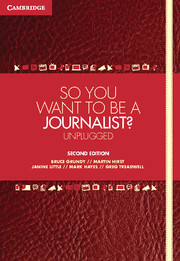Book contents
- Frontmatter
- Contents
- About the authors
- Preface to the second edition
- Acknowledgements
- Acknowledgements for the second edition
- Introduction Journalism unplugged
- Part 1 DISCOVERING JOURNALISM
- Part 2 FINDING AND UNDERSTANDING NEWS
- 3 Research and finding things
- 4 Facts and figures
- Part 3 NEWS-WRITING ACROSS THE GENRES
- Part 4 Legal and ethical issues
- References
- Index
3 - Research and finding things
from Part 2 - FINDING AND UNDERSTANDING NEWS
Published online by Cambridge University Press: 05 October 2012
- Frontmatter
- Contents
- About the authors
- Preface to the second edition
- Acknowledgements
- Acknowledgements for the second edition
- Introduction Journalism unplugged
- Part 1 DISCOVERING JOURNALISM
- Part 2 FINDING AND UNDERSTANDING NEWS
- 3 Research and finding things
- 4 Facts and figures
- Part 3 NEWS-WRITING ACROSS THE GENRES
- Part 4 Legal and ethical issues
- References
- Index
Summary
Chapter objectives
After reading this chapter, you should understand the following:
How and why journalists, as ‘knowledge workers’, share much in common with librarians, and should learn from librarians when seeking, sieving and processing raw ‘information’ into knowledge published as stories
How to strengthen and engage your critical faculties to ‘sift’ and ‘sort’ useful information from rubbish
How to start using social media sites such as Twitter and Facebook for journalism
How to conduct both online and offline searches that go beyond simply ‘Googling’ something
What entry points exist to help you venture into the ‘deep’ or ‘hidden’ web
… the unvarnished truth is that journalists do not happen by chance upon the news which is daily gathered together for public edification. It has to be anticipated, prepared for, and followed up, and the greatest virtue of all in a newsman is anticipation. That is what is really meant by the phrase ‘a nose for news’.
Carr & Stevens, Modern Journalism (1931)Doing research for journalism usually involves using a combination of research skills, so unpacking them here is somewhat artificial. Much of what is described or suggested here might take seconds, or could develop into a major investigation taking days or even months. Throughout, however, it is vital to remember that you are a journalist and your core business is stories. This chapter introduces the research process upon which all good journalism relies. As information or ‘knowledge’ workers, journalists need a high level of information literacy.
News does not just fall into the lap of a journalist. This is true despite the endless tsunami of media announcements, press releases and tip-offs that pour into the newsroom every day. As the writers of Modern Journalism expressed it in 1931, most of this material is not really news at all; it is ‘too trivial in content to be so dignified’. A good reporter and a competent editor will know that all the information must be sifted, sorted and given an angle before it can become news; it has to be important or interesting – or preferably both: ‘News may be important without being interesting, and the converse applies,’ Modern Journalism tell us, but without our ability to know whether it is either, we will not know news even if it is right under our noses.
- Type
- Chapter
- Information
- So You Want To Be A Journalist?Unplugged, pp. 65 - 94Publisher: Cambridge University PressPrint publication year: 2012



